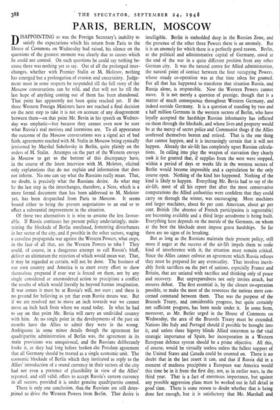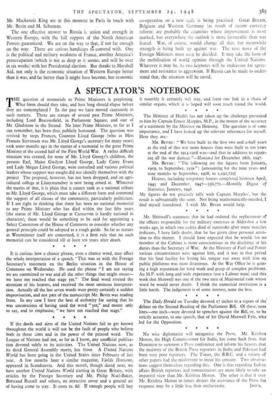PARIS, BERLIN, MOSCOW
DISAPPOINTING as was the Foreign Secretary's inability to satisfy the expectations which his return from Paris to the House of Commons on Wednesday had raised, his silence on the questions of the greatest moment was clearly due to causes which he could not control. On such questions he could say nothing be- cause there was nothing yet to say. Out of all the prolonged inter- changes, whether with Premier Stalin or M. Molotov, nothing has emerged but a prolongation of evasion and uncertainty. Judge- ment must in some respects be suspended till the full story of the Moscow conversations can be told, and that will not be till the last hope of anything coming out of them has been abandoned. That point has apparently not been quite reached yet. If the three Western Foreign Ministers have not reached a final decision on the next step to take it is not on account of any disagreement between them—on that point Mr. Bevin in his speech on Wednes- day was emphatic—but because they cannot even now be sure what Russia's real motives and intentions are. To all appearance the outcome of the Moscow conversations was a signal act of bad faith, agreements reached with M. Stalin in Moscow being cynically jettisoned by Marshal Sokolovsky in Berlin, quite plainly on the orders of M. Stalin. Attempts an the part of the Western envoys in Moscow to get to the bottom of this discrepancy have, in the course of the latest interview with M. Molotov, elicited only explanations that do not explain and information that does not inform. No one can say what the Russians really mean. That, no doubt, is precisely what the Russians desire. As what may be the last step in the interchanges, therefore, a Note, which is a more formal document than has been addressed to M. Molotov yet, has been despatched from Paris to Moscow. It seems bound either to bring the present negotiations to an end or to effect a substantial improvement in the situation.
Of those two alternatives it is wise to assume the less favour- able. If Russia continues her present policy undeviatingly, main- taining the blockade of Berlin unrelaxed, fomenting disturbances in her sector of the city, and if possible in the other sectors, waging a ceaseless propaganda war against the Western Powers, what steps, in the face of all that, are the Western Powers to take ? They could, of course, in a dangerous attempt to call Russia's bluff, deliver an ultimatum the rejection of which would mean war. That, it may be regarded as certain, will not be done. The business of our own country and America is to ,exert every effort to show themselves prepared if ever war is forced on them, not by any single considered or unconsidered action to precipitate a conflict • the results of which would literally be beyond human imagination. If war comes it must be at Russia's will, not ours ; and there is no ground for believing as yet that even Russia means war. But if we are resolved not to move an inch towards war we cannot move an inch back from where we stand today. In what he had to say on that point Mr. Bevin will carry an undivided country with him. At no single point in the developments of the past six months have the Allies to admit they were in the wrong. Ambiguous in some minor details though the agreement for quadripartite administration of Berlin was, the agreement in its main provisions was unequivocal, and the Russians deliberately broke it, as they had long before broken .the Potsdam agreement that all Germany should be treated as a single economic unit. The economic blockade of Berlin which they instituted as reply to the Allies' introduction of a sound currency in their sectors of the city had not even a pretence of plausibility in view of the Allies' repeated, and still valid, offers to accept Russia's eastern currency in all sectors, provided it is under genuine quadripartite control.
There is only one conclusion, that the Russians are still deter- pined to drive the Western Powers from Berlin. That desire is intelligible. Berlin is embedded deep in the Russian Zone, and the presence of the other three Powers there is an anomaly. But it is an anomaly for which there is a perfectly good reason. Berlin, as the political and administrative capital of Germany, stood at the end of the war in a quite different position from any other German city. It was the natural centre for Allied administration, the natural point of contact between the four occupying Powers, whose steady co-operation was at that time taken for granted. For all that has happened to transform that situation Russia, and Russia alone, is responsible. Now the Western Powers cannot move. It is not merely a question of prestige, though that is a matter of much consequence throughout Western Germany, and indeed outside Germany. It is a question of standing by two and a half million Germans in the western sectors of Berlin, who have loyally accepted the hardships Russian inhnmanity has inflicted on them through the blockade, and whose lives and property would be at the mercy of secret police and Communist thugs if the Allies confessed themselves beaten and retired. That is the one thing that cannot happen, and it is increasingly certain that it will not happen. Already the air-lift has completely upset Russian calcula- tions. In calling into play the weapon of starvation they clearly took it for granted that, if supplies from the west were stopped, within a period of days or weeks life in the western sectors of Berlin would become impossible and a capitulation be the only course open. Nothing of the kind has happened. Nothing of the kind is likely to happen. Everything Mr. Bevin had to say of the air-lift, most of all his report that after the most conservative computations the Allied authorities were confident that they could carry on through the winter, was encouraging. More machines and larger machines, about 6o per cent. American, about 40 per cent. British (the absence of French participation is regrettable) are becoming available and a third large aerodrome is being built. Everything here depends on the morale of the Germans, on whom at the best the blockade must impose grave hardships. So far there are no signs of its breaking.
But as long as the Russians maintain their present policy, still more if anger at the success of the air-lift impels them to smile kind of interference with it, the situation must remain critical. Since the Allies cannot enforce an agreement which Russia refuses they must be prepared for any eventuality. That involves inevit- ably fresh sacrifices on the part of nations, especially France and Britain, that are satiated with sacrifice and thinking only of peace and recovery. But unpreparedness not only invites attack, but ensures defeat. The first essential is, by the closest co-operation possible, to make the most of the resources the nations most con- cerned command between them. That was the purpose of the Brussels Treaty, and considerable progress, but quite certainly not sufficient progress, has been made under it. In some form, moreover, as Mr. Butler urged in the House of Commons on Wednesday, the area Of the Brussels Treaty must be extended. Nations like Italy and Portugal should if possible be brought into it, and unless sheer bigotry blinds Allied statesmen to the vital strategic importance of Spain, her incorporation in a Western European defence system should be a prime objective. All this, of course, would be virtually useless unless the fullest support of the United States and Gina& could be counted on. There is no doubt that in the last resort it can, and that if Russia did in a moment of madness precipitate a European war America would this time be in it from the first day, not, as in earlier wars, in the third year. That is a fact of enormous, importance, but against any possible aggression plans must be worked out in full detail in good time. There is some reason to doubt whether that is being done fast enough, but it is satisfactory that Mr. Marshall and Mr. Mackenzie King are at this moment in Paris in touch with Mr. Sevin and M. Schuman.
The one effective answer to Russia is union and strength in Western Europe, with the full support of the North American Powers guaranteed. We are on the way to that, if not far enough on the way. There are serious handicaps tit contend with. One is the political and military weakness of France, another America's preoccupation (which is not as deep as it seems, and will be over in six weeks) with her Presidential election. But thanks to Marshall Aid, not only is the economic situation of Western Europe better than it was, and far better than k might have become, but economic co-operation on a new scale is being practised. Great Britain, Belgium and Western Germany (as result of recent currency reform) are probably the countries where improvement is nrast marked, but everywhere the outlook is more favourable than was feared. War, of course, would change all that, but meanwhile strength is being built up against war. The next move of the Foreign Ministers must soon be decided. It may take the form of the mobilisation of world opinion through the United Nations. Whatever it may be, its two keynotes will be endeavour for agree- ment and resistance to aggression. If Russia can be made to under- stand that, the situation will be saved.



































 Previous page
Previous page